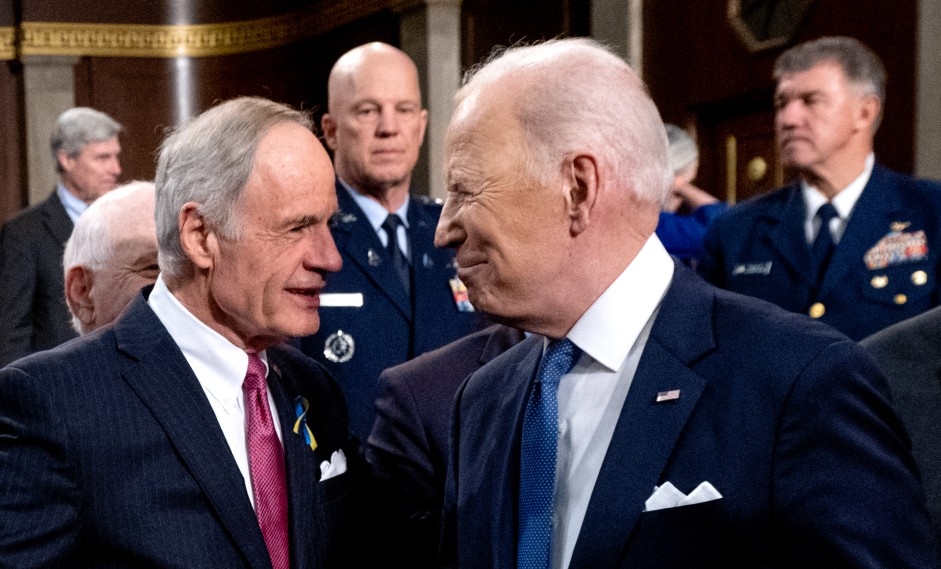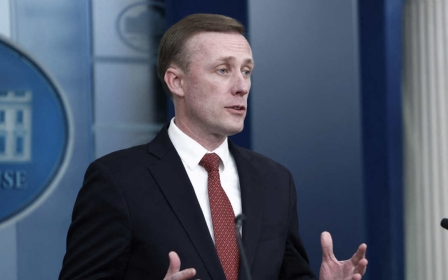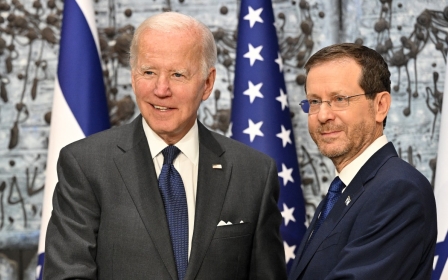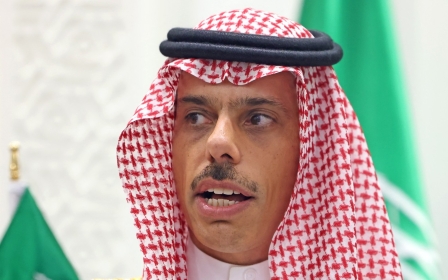US senators urge Biden to begin working on a two-state solution in Israel-Palestine

A group of 19 democratic senators has sent a letter to US President Joe Biden urging his administration to establish a “bold, public framework” for establishing a two-state solution in Israel and Palestine.
Led by Senator Tom Carper, the group is calling for the Biden administration to "recognize a nonmilitarized Palestinian state, which includes the West Bank and Gaza, to be governed by a revitalized and reformed Palestinian Authority (PA)".
"The road to enduring peace in the region depends entirely on the two-state solution—the establishment of a Palestinian state, existing in concert with a regionally-integrated Israel", the letter continues.
Potential solutions on who is to govern Gaza after the war have so far enjoyed little consensus. Last week, announcements were made in Israeli media that the head of the PA’s intelligence apparatus, Majed Faraj, has reportedly been put forward as a potential post-war administrator of the besieged Gaza Strip.
During an interview with Al Jazeera, Hossam Badran, a member of Hamas's political bureau based in Doha, Qatar, said in response that there will be no internal Palestinian agreement without a reconciliation of the various Palestinian factions and forces.
A survey this week showed that more than 50 percent of Palestinians believe Hamas should govern the Gaza Strip when the current war ends, while just 11 percent want PA President Mahmoud Abbas to administer the enclave.
The findings were published in Ramallah on Wednesday by the Palestinian Center for Policy Survey and Research (PCPSR) and the Konrad-Adenauer-Stiftung (KAS).
Fifty-nine percent of the respondents in Gaza and the occupied West Bank said they wanted Hamas to run post-war Gaza, a five percent drop from their last poll in December.
Another 13 percent said they hoped the PA would return to control the Strip but only under the leadership of someone other than Abbas.
The group of US senators also included in the letter a set of governmental and institutional reforms for the PA, and the requirement of the PA to both recognise the state of Israel as well as "renounce Hamas and all terrorist activity".
The letter comes amid a growing rift between Israel and its staunchest ally, the US. Israel's plan to invade Rafah has been met with US and global opposition, and Biden labelled a potential ground invasion in Rafah a "mistake" during a phone call with Netanyahu last week.
A few days ago, Senate Majority Leader Chuck Schumer called Netanyahu an “obstacle to peace” and urged Israelis to hold new elections. Netanyahu then wanted to address senators by video this week, but Schumer rejected the request.
Diplomatic efforts in establishing a sovereign Palestinian state have stalled in recent years. Growing settlement expansion in the West Bank and increasing financial support for settlements by the Israeli government have greatly undermined the viability of a two-state solution.
In light of the severity of Gaza's humanitarian crisis and famine as a result of Israel's six-month-long bombing campaign, the urgency of humanitarian solutions rather than political ones has dominated discourse.
Support for a two-state solution in Gaza
Support for a two-state solution among people living in Gaza has, however, shown an increase from 35 percent in December to 62 percent in March, as recent polling data, conducted by PCPSR, suggests.
The polling was conducted between 5-10 March in the West Bank and areas of the Gaza Strip where there was "no ongoing daily fighting" and with a sample size of 1,580 adults, of whom 830 were interviewed face to face in the West Bank (in 83 locations) and 750 in the Gaza Strip (in 75 locations).
From 30 percent in September 2023 to 33 percent by December and 34 percent by March, support for a two-state solution in the West Bank barely grew compared to Gaza.
The data also showed a drop in support for armed resistance as the best means of achieving a Palestinian state from its peak in December.
While support for armed resistance was 68 percent in the West Bank and 56 percent in the Gaza Strip in December, March polling data shows support for armed resistance at 51 percent in the West Bank, and 39 percent in Gaza.
Support for the two-state solution does not come from within the US alone. German Foreign Minister Annalena Baerbock and UK Defence Minister Grant Shapps have both reiterated that a two-state solution is the only solution to peace.
EU Foreign Minister Josep Borrell recently said that instead of talking about the Middle East peace process, "we should start talking specifically about the two-state-solution implementation process”.
Middle East Eye propose une couverture et une analyse indépendantes et incomparables du Moyen-Orient, de l’Afrique du Nord et d’autres régions du monde. Pour en savoir plus sur la reprise de ce contenu et les frais qui s’appliquent, veuillez remplir ce formulaire [en anglais]. Pour en savoir plus sur MEE, cliquez ici [en anglais].




